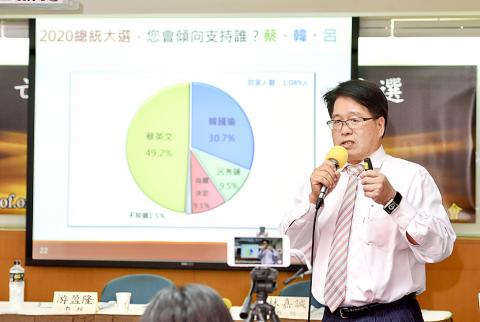The Taiwan People’s Party (TPP) — founded in August by Taipei Mayor Ko Wen-je (柯文哲) — has squeezed out the New Power Party (NPP) to become the third-most popular political party, a Taiwanese Public Opinion Foundation survey has found.
The Democratic Progressive Party (DPP) led the pack with an approval rating of 29.7 percent, followed by the Chinese Nationalist Party’s (KMT) 29.1 percent and the TPP, which had an approval rating of 10.9 percent, the survey, which was released yesterday, showed.
Fourth and fifth were the NPP and the People First Party (PFP), with approval ratings of 5.6 percent and 2.2 percent respectively, it showed.

Photo: Peter Lo, Taipei Times
No other parties reached 1 percent in the poll.
Compared with a similar poll last month, party affiliation has not changed much, with the two major parties having approximately equal strength, the foundation said.
However, support for the TPP rose 2.8 percentage points, while the NPP’s fell 1.1 percentage points, the poll showed.
A change of 1 or 2 percentage points could mean a lot for small parties, despite such fluctuations falling within the margin of error, the foundation said.
“The rapid decrease in support for the NPP is obvious, while whether the TPP takes advantage of this opportunity and rises further requires continued observation,” the foundation said.
The poll asked respondents who they prefer between President Tsai Ing-wen (蔡英文), who is seeking re-election as the DPP’s candidate, and Kaohsiung Mayor Han Kuo-yu (韓國瑜), representing the KMT, in the presidential election on Jan. 11.
Tsai was backed by 51.3 percent of respondents, while 33.9 percent said they supported Han.
A breakdown of respondents’ political affiliations showed that 97 percent of DPP supporters backed Tsai, while 82.1 percent of KMT supporters backed Han, it showed.
Asked who they would support if former vice president Annette Lu (呂秀蓮) — who is now collecting signatures to meet a deadline on Saturday to be eligible to run as an independent — were an option next year, 49.2 percent of respondents said they would support Tsai, 30.7 percent backed Han and 9.5 percent favored Lu, the survey found.
Asked who they would back if PFP Chairman James Soong (宋楚瑜) was a choice along with Tsai and Han, 46.1 percent said they would back Tsai, 31.1 percent supported Han and 11.4 percent backed Soong, it showed.
The foundation asked whether respondents agreed with the statement: “If Tsai loses in the 2020 presidential election, then Taiwan has no more hope.” It showed that 22.6 percent agreed with the statement, while 71.3 percent disagreed.
Asked: “If Han loses in the 2020 presidential election, then the Republic of China has no more hope,” 79.7 percent disagreed and 15.6 percent agreed.
The survey was conducted on Monday and Tuesday last week via telephone. It collected valid 1,089 samples from respondents aged 20 or above from across Taiwan. It has a margin of error of 2.97 percentage points.

The Ministry of Education (MOE) is to launch a new program to encourage international students to stay in Taiwan and explore job opportunities here after graduation, Deputy Minister of Education Yeh Ping-cheng (葉丙成) said on Friday. The government would provide full scholarships for international students to further their studies for two years in Taiwan, so those who want to pursue a master’s degree can consider applying for the program, he said. The fields included are science, technology, engineering, mathematics, semiconductors and finance, Yeh added. The program, called “Intense 2+2,” would also assist international students who completed the two years of further studies in

Former president Tsai Ing-wen (蔡英文) departed for Europe on Friday night, with planned stops in Lithuania and Denmark. Tsai arrived at Taiwan Taoyuan International Airport on Friday night, but did not speak to reporters before departing. Tsai wrote on social media later that the purpose of the trip was to reaffirm the commitment of Taiwanese to working with democratic allies to promote regional security and stability, upholding freedom and democracy, and defending their homeland. She also expressed hope that through joint efforts, Taiwan and Europe would continue to be partners building up economic resilience on the global stage. The former president was to first

Former president Tsai Ing-wen (蔡英文) on Monday called for greater cooperation between Taiwan, Lithuania and the EU to counter threats to information security, including attacks on undersea cables and other critical infrastructure. In a speech at Vilnius University in the Lithuanian capital, Tsai highlighted recent incidents in which vital undersea cables — essential for cross-border data transmission — were severed in the Taiwan Strait and the Baltic Sea over the past year. Taiwanese authorities suspect Chinese sabotage in the incidents near Taiwan’s waters, while EU leaders have said Russia is the likely culprit behind similar breaches in the Baltic. “Taiwan and our European

The Taipei District Court sentenced babysitters Liu Tsai-hsuan (劉彩萱) and Liu Jou-lin (劉若琳) to life and 18 years in prison respectively today for causing the death of a one-year-old boy in December 2023. The Taipei District Prosecutors’ Office said that Liu Tsai-hsuan was entrusted with the care of a one-year-old boy, nicknamed Kai Kai (剴剴), in August 2023 by the Child Welfare League Foundation. From Sept. 1 to Dec. 23 that year, she and her sister Liu Jou-lin allegedly committed acts of abuse against the boy, who was rushed to the hospital with severe injuries on Dec. 24, 2023, but did not